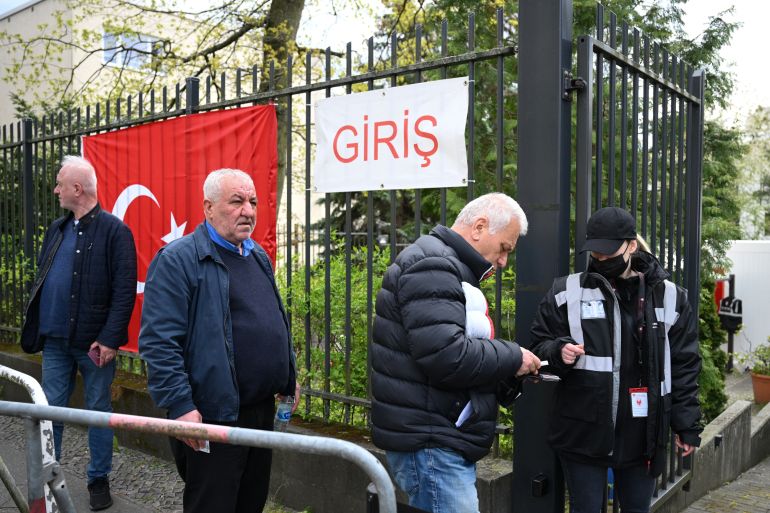Expats start voting in Turkey election run-off
Polls recommenced for Turkish expats on Saturday, presenting regional divide and growing urges for participation.

The Turkish diaspora has begun voting in Turkey’s presidential run-off between incumbent Recep Tayyip Erdogan and his challenger Kemal Kilicdaroglu, who is seeking to end Erdogan’s two-decade rule.
Footage and photos from polling stations across the globe on Saturday appeared to show large numbers of people queueing to vote.
Keep reading
list of 3 itemsTurkey election results 2023 by the numbers
What’s a run-off? All to know about Turkey election results
The second round of voting takes place domestically on May 28 after Erdogan fell just short of the 50 percent threshold needed to win the presidential vote outright on May 14, in what had been interpreted to be his greatest political challenge.
Some 3.4 million Turks abroad are eligible to vote, or about 5 percent of total votes.
The diaspora vote had a clear impact on the outcome of the first round of the presidential election, with each politician retaining his strongholds in Europe where more than five million people of Turkish descent live.
In Germany, which hosts the largest diaspora population and 1.5 million eligible voters, Erdogan was ahead with 65 percent of votes.
However, the results across Europe were polarised, with Kilicdaroglu dominating in the United Kingdom, Southern and Eastern Europe, including the Balkans, Finland and Sweden.
Newer communities of Turkish immigrants in Poland and Estonia voted overwhelmingly in favour of the opposition at 85 and 91 percent, respectively.
The Turkish government asked to set up 26 polling stations at consulates and other locations around Germany, hoping to make voting more convenient for Turkish citizens here; Germany approved 16 of them.
The opposition Republican People’s Party (CHP) has spent six months trying to convince undecided voters and mobilise those who had not voted in the past.
“Wherever you are in the world, heading to the ballot box in this election is a national duty,” Kilicdaroglu said in a video on his Twitter feed.
Meanwhile, Erdogan posters went up in the southern city of Nuremberg late last month, causing controversy among local German politicians.
Public discourse and the multilevel decision
Serap Guler, a German MP of Turkish descent, said the close election result represented a failure for Erdogan and his ruling Justice and Development Party (AK Party).
“He has the entire state and media apparatus behind him,” she said.
“This was not a fair election, but one with unequal resources – nonetheless he has to go to a run-off. A real loss of face for him.”
Speaking to Euronews last week, vote observer Onur Can Varoglu said: “Turkish politics is like football, you are born with your team and will support it no matter what.”
“It doesn’t matter if you come to Europe. If you are from a nationalist, Islamist background or a more pro-European immigrant one, you bring these values with you,” he said, suggesting family values were ultimately behind how Turks voted.
Attention is now focused on nationalist Sinan Ogan, the candidate who came third with 5.17 percent support. Any decision by him to support one of the two candidates in the run-off could be decisive.
Ogan told Reuters news agency that he would support Kilicdaroglu in the run-off “if he agrees to offer no concessions to a pro-Kurdish party”.
Yet distancing himself from the Kurdish vote would be disastrous for Kilicdaroglu, who won heavily in Kurdish-dominated cities.
Kilicdaroglu and the AK Party’s Binali Yildirim, a former prime minister, were reported to have held a phone call with Ogan following the vote.
Ultranationalist politicians – present in the governing and opposition alliances, as well as among independents – have made the expulsion of the nearly four million Syrian refugees in the country their top demand.